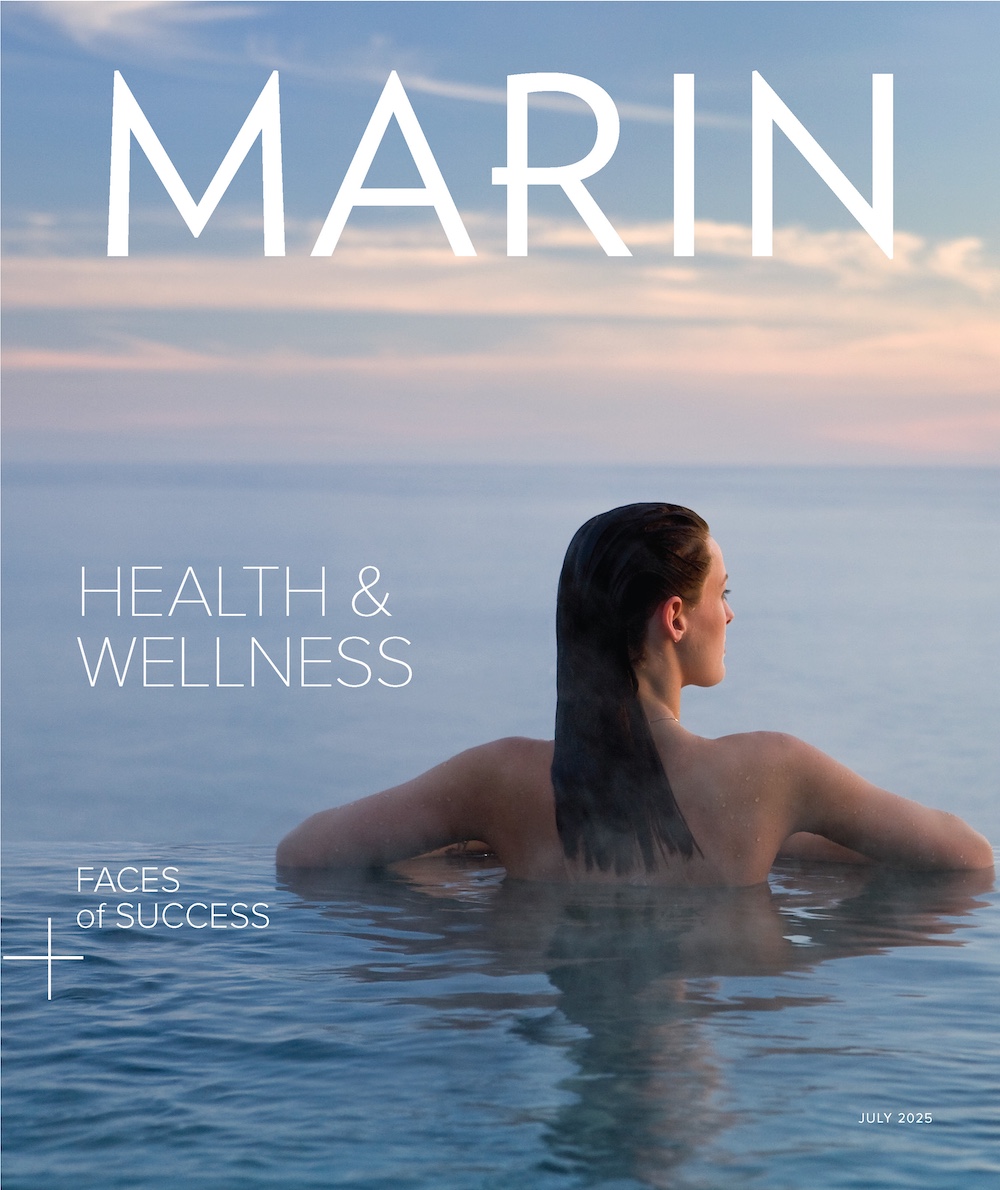 TEN DAYS BEFORE the birth of my first child, I woke up and realized half of my face was paralyzed. The combination of an autoimmune disease with the rigors of pregnancy changed my life completely. While part of how that experience transformed my life was described in an article called “Reinvention” in this magazine’s January issue, the bigger story now is that it intensified my commitment to healthy living. I ditched my tech job to pursue a lifelong passion for exploring science, nutrition and the process of aging. There is a science to aging gracefully, and I am obsessed with every whisper of a secret pill, sometimes chasing seemingly outlandish claims to find the root of a possible health benefit. I have traveled the globe interviewing the world’s top scientists, researchers and industry leaders, seeking to further understand the common denominators of longevity and health.
TEN DAYS BEFORE the birth of my first child, I woke up and realized half of my face was paralyzed. The combination of an autoimmune disease with the rigors of pregnancy changed my life completely. While part of how that experience transformed my life was described in an article called “Reinvention” in this magazine’s January issue, the bigger story now is that it intensified my commitment to healthy living. I ditched my tech job to pursue a lifelong passion for exploring science, nutrition and the process of aging. There is a science to aging gracefully, and I am obsessed with every whisper of a secret pill, sometimes chasing seemingly outlandish claims to find the root of a possible health benefit. I have traveled the globe interviewing the world’s top scientists, researchers and industry leaders, seeking to further understand the common denominators of longevity and health.
This research compelled me to distill and share findings with clients of my wellness lifestyle company, Sprig and Glow. And today, through positive lifestyle choices, 19 years after the onset of a potentially devastating affliction, I have regained 80 percent of my facial movement and all but reversed the autoimmune disease. I am thriving as an aesthetician, working on production of a wellness lifestyle television show and planning a trip to Italy to do research for a book.
There has been extensive research on longevity, with studies showing that happier individuals are healthier individuals — less at risk for cancer, diabetes, heart problems or even early death. To compile the list that follows, I’ve added on to an article from our sister publication Make It Better by Leslie Goldman, who drew from tips in the recently published AARP and National Geographic book Love Your Age: The Small-Step Solution to a Better, Longer, Happier Life, by Barbara Hannah Grufferman. “Small steps can definitely add up to healthier aging,” Grufferman writes. “You don’t have to go from zero exercise to running a marathon, or from eating burgers and fries to being a vegan. Relatively easy tweaks to existing habits can and will help, and one healthy habit will lead to another.” Keep reading for five habits of people who age well.
1. Reach Out
“Loneliness and social isolation have powerful effects on health,” says Elissa Epel, a professor in the department of psychiatry at the University of California, San Francisco and director of the UCSF Aging, Metabolism, and Emotions Center. Being disconnected from friends and family is linked with a higher risk of disease and earlier mortality. In fact, “it’s as big of a risk factor as smoking,” Epel says.
It’s not about being a social butterfly; quality trumps quantity. “You want to make sure you have someone you can depend on for support,” she explains. Consider signing up for a local class featuring an activity you enjoy, like painting or dance, to meet like-minded friends. Volunteering and religious activities are other opportunities for new friendships to develop organically.
—BARBARA HANNAH GRUFFERMAN, AUTHOR OF THE AARP AND NATIONAL GEOGRAPHIC BOOK
LOVE YOUR AGE: THE SMALL-STEP SOLUTION TO A BETTER, LONGER, HAPPIER LIFE
—BARBARA HANNAH GRUFFERMAN
2. DO NOTHING
Science now suggests what earlier generations have always known. A day of rest is vital to your health. But why? It turns out that meditation in particular may actually increase the length of your telomeres. Why is this significant? Telomeres are the caps that reside at the end of your chromosomes, and as we age and endure stress in life, these telomeres deteriorate and shorten, which leads to aging. Elizabeth Blackburn, a Nobel prize–winning biochemist, and the aforementioned Epel have conducted a series of clinical trials proving that meditation reduces stress and thus lengthens telomeres, while the research also shows that stress will reduce the length. If meditation isn’t your thing, there are other ways to decompress. Leave that smartphone at home and walk in nature, take a bath, listen to music or curl up on the couch with a good book. Whatever your choice, allow yourself the downtime your body needs.
3. GO BLUE
Researchers refer to them as Blue Zones: five places in the world where people live to age 100. They are the Italian island of Sardinia; Okinawa, Japan; Loma Linda, California; Costa Rica’s isolated Nicoya Peninsula; and Ikaria, an isolated Greek island. “People in these zones live longer and generally happier and healthier lives,” Dan Buettner writes in his book The Blue Zones: Lessons for Living Longer From the People Who’ve Lived the Longest. “In Ikaria, Greece, people suffer dementia at a quarter the rate of that in the U.S. Men there, in particular, are about four times as likely to reach age 90 as Americans.” The typical diet of Ikarians is rich in unsaturated plant oils, along with plenty of vegetables and fruits, beans and whole grains, with meat eaten only sparingly. Heart disease, depression and diabetes are also rare in blue zones.
Recently, JumpStart MD hosted a two-day conference in San Francisco where the world’s leading scientists and other experts presented their latest findings. The one point every presenter agreed on was that an abundance of “bad” carbohydrates (such as processed foods, chips, cookies and cereals, conventional white bread, pastries, white rice) and sugar are the core causes of a multitude of preventable metabolic conditions such as diabetes and inflammation. Whether you are a vegetarian or choose another dietary route, keep in mind that reducing the inflammatory carbs you eat, combined with a plant-based diet that includes small portions of lean proteins and an abundance of healthy fats, can keep you healthy.
Basically, the days of the radically low-fat diet are behind us, according to the National Institutes of Health. The brain is 60 percent fat and needs that fat to operate optimally. Essential fatty acids (EFAs), in particular omega-3 fatty acids, and monounsaturated fats are important for brain development and continued cognition. So give that salad a pour of olive oil and add some nuts and seeds and an avocado.
4. JUST MOVE
In 400 B.C., Hippocrates was the first physician on record to recommend exercise as a prescription for health. And in a twist the Greek healer could never have imagined, emptying the dishwasher counts. As we age there is a tendency to slow down and become more sedentary, but our bodies were meant to move. And bluezone centenarians have these lifestyle habits in common: they walk a lot, tend their own gardens and cook for themselves. The U.S. Department of Health and Human Services recommends at least 150 to 300 minutes of moderate activity or 75 to 150 minutes of vigorous activity each week. You do not need to be a runner to stay healthy; the point is to keep moving. Exercise slows the aging process and helps maintain immune function and cardiovascular health.
Another beneficiary is the brain, which only weighs about three pounds yet needs 20 percent of the oxygen and nutrients you take in to function optimally. And the best way to get that energy to the brain is through a healthy cardiovascular system, says Keith Fargo, Ph.D., director of Scientific Programs and Outreach for the Alzheimer’s Association. “With every heartbeat, your arteries carry about 20 to 25 percent of your blood to your brain, where billions of cells utilize the oxygen and nutrients. So anything you do for heart health is generally good for brain health.”
Exercise also combats age-related muscle loss, which after age 30 happens at a rate of about 3 to 5 percent per decade. Less muscle leads to less mobility and strength. No matter your age or current fitness level, it’s never too late to incorporate movement and strength training into your daily life. As Grufferman writes, “People think as we get older, we should slow down, not push ourselves as much. On the contrary. We need to push ourselves even more. You can make changes on a deep cellular level by pushing your body out of its comfort zone.”
5. Keep Learning
Grab your passport: travel is one ticket to better brain health. But it’s not the only way; learning a new skill or game can also help, as will that Sunday crossword puzzle habit. As we age, the brain loses elasticity and ability to make cognitive connections; unfamiliar experiences that stimulate formation of such connections can boost intellectual agility and even brain size. So maybe it’s time to try your hand at mah-jongg or finally learn Italian. Even late in life, exploring different subjects, staying active, eating wisely, getting your rest, and deep human connections are proven pathways to feeling young.


